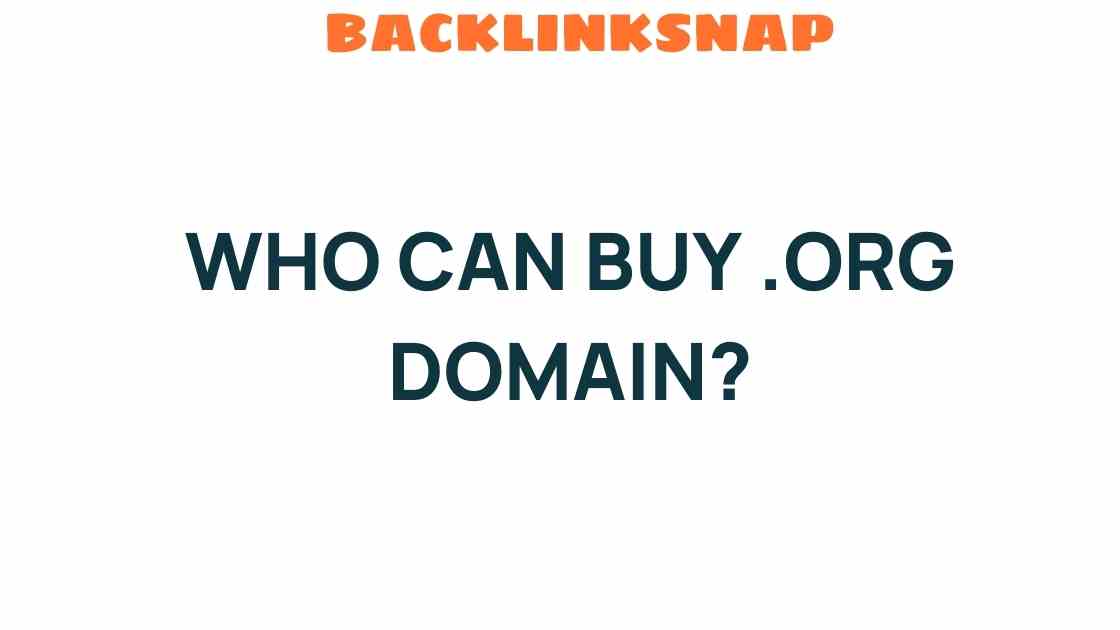Who Can Buy a .ORG Domain? Unraveling the Mystery Behind Eligibility
In the vast universe of internet domains, the .ORG domain stands out as a beacon for various organizations, particularly non-profits. But who exactly can buy a .ORG domain? This question often puzzles many, especially those new to the world of domain registration. Understanding the eligibility criteria is essential for anyone looking to establish a digital identity or enhance their online presence. In this article, we’ll delve into the specifics of .ORG domain eligibility, exploring who can register these domains and what it means for their organizations.
Understanding the .ORG Domain
The .ORG domain is one of the original top-level domains (TLDs) established in 1985. Initially intended for non-profit organizations, it has evolved over the years to encompass a wider array of entities. Today, it serves as a versatile option for any group or individual looking to create a credible online presence. While many associate .ORG with non-profits, the domain is open to anyone who meets the registration guidelines.
Eligibility Criteria for .ORG Domain Registration
When it comes to domain registration, eligibility criteria can vary by TLD. For the .ORG domain, the rules are fairly relaxed compared to other domains, such as .GOV or .EDU, which have strict restrictions. Here’s what you need to know about the eligibility criteria:
- Non-Profit Organizations: Traditionally, .ORG domains were primarily reserved for non-profit entities. Organizations that qualify as non-profits under relevant laws can easily register for a .ORG domain.
- For-Profit Entities: While .ORG is synonymous with non-profits, for-profit organizations can also register .ORG domains. This flexibility allows businesses to adopt a more community-oriented approach.
- Individuals: Individuals can also register .ORG domains, especially if they are creating a project with a non-profit focus or community service initiative.
- Advocacy Groups: Non-governmental organizations (NGOs) and advocacy groups that aim to promote social causes are encouraged to use .ORG domains to enhance their credibility.
- Educational and Research Institutions: While .EDU is the primary choice for educational institutions, many research and educational initiatives choose .ORG to underline their commitment to public benefit.
The Importance of a .ORG Domain for Your Organization
Having a .ORG domain can significantly impact an organization’s digital identity. Here’s why it matters:
- Credibility: A .ORG domain conveys a sense of trust and reliability, which is crucial for non-profits and community-focused initiatives.
- Visibility: Search engines often rank .ORG domains favorably, especially for queries related to non-profit activities, enhancing your online presence.
- Community Engagement: A .ORG domain can foster a sense of belonging and community among supporters and volunteers.
- Brand Recognition: The .ORG extension is widely recognized, making it easier for users to remember your organization’s web address.
How to Register a .ORG Domain
Registering a .ORG domain is straightforward. Follow these steps:
- Choose a Domain Name: Select a name that reflects your organization’s mission and is easy to remember.
- Select a Domain Registrar: Choose an accredited domain registrar. Reputable registrars include GoDaddy, Namecheap, and Google Domains.
- Check Availability: Use the registrar’s search tool to check if your desired domain name is available.
- Complete the Registration Form: Fill out the necessary information, including your organization’s details.
- Pay the Registration Fee: Domain registration typically involves an annual fee, so ensure you’re prepared for this expense.
Challenges and Considerations
While registering a .ORG domain is accessible, there are some challenges and considerations to keep in mind:
- Domain Name Squatting: Be aware of the possibility that your desired domain name might already be taken. Consider variations if necessary.
- Renewal Fees: Remember that domain registration is not a one-time expense. You’ll need to renew your domain annually.
- Misrepresentation: Some for-profit entities misuse .ORG domains, which can affect the perception of genuine non-profits. Always ensure your organization aligns with the ethos of a .ORG.
FAQs about .ORG Domain Registration
1. Can anyone register a .ORG domain?
Yes, anyone can register a .ORG domain, including non-profits, for-profits, individuals, and advocacy groups.
2. Is there a specific requirement to register a .ORG domain?
There are no strict requirements, but it is advisable that the purpose of the domain aligns with the non-profit ethos.
3. How much does it cost to register a .ORG domain?
Costs can vary by registrar but typically range from $10 to $50 per year, depending on the registrar and additional services.
4. Can I transfer my .ORG domain to another registrar?
Yes, you can transfer your .ORG domain to another registrar, but be sure to follow the specific procedures outlined by both registrars.
5. What if my desired .ORG domain name is taken?
You can consider variations of the name or use different keywords that still reflect your organization’s mission.
6. Do I need to provide documentation to register a .ORG domain?
No documentation is generally required, but having a legitimate purpose for the domain is essential for maintaining credibility.
Conclusion
In summary, the .ORG domain remains a vital asset for individuals and organizations looking to establish a meaningful online presence. With its roots in non-profit initiatives, the eligibility criteria for a .ORG domain have expanded, welcoming a diverse range of registrants. Whether you’re a non-profit organization, a for-profit entity with a community focus, or an individual with a project that promotes social good, a .ORG domain can significantly enhance your digital identity. As you embark on the journey of domain registration, remember that a .ORG domain is not just a web address; it’s a commitment to fostering community, trust, and engagement in the digital realm. For more insights on domain registration, you can visit ICANN or explore services from GoDaddy.
This article is in the category Digital Marketing and created by BacklinkSnap Team




